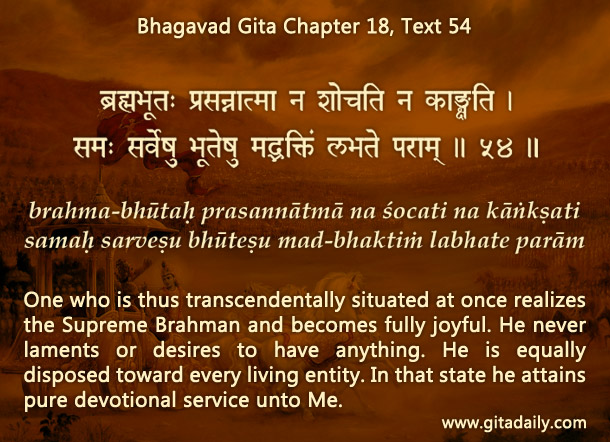
Impersonalism is the notion that ultimate reality is without any personal attributes. It conceives of spiritual perfection as freedom from all emotions and reciprocations, the underlying basis of personal and interpersonal existence.
The Gita (18.54) mentions this state, wherein one sees all things and beings with equal vision. Intriguingly though, the Gita declares it to be not the spiritual zenith, but the prelude to the zenith, which is pure devotion.
Gita wisdom explains that emotions and reciprocations are innate to us as sentient souls, parts of the all-attractive Supreme Being, Krishna (15.07). We become entangled not because of our emotions and reciprocations per se, as impersonalists misconstrue, but because of our misdirection of those intrinsic features towards temporary material things. So, spiritual perfection requires not their eradication, but their redirection from matter to Krishna.
Consequently, the ceiling of impersonalism, the state of being free from material emotions, is the beginning of transcendental personalism, the arena of bhakti-yoga, a world filled with spiritual emotions centered on Krishna. Such divine emotions not only liberate us from the miseries of material existence but also elevate us into higher and richer states of rapture and ecstasy in his remembrance.
And bhakti-yoga is so accessible that it enables us to start relishing transcendental emotions even in our present entangled state. How? By training us to use material things in Krishna’s service. Thus, bhakti-yoga bypasses the demanding progression required of impersonalists: first, laboriously raise themselves up to the ceiling against the gravity of their material desires; and then, if they somehow realize that there’s a world beyond the ceiling, find a way to break through the ceiling, that is, give up their attachment to the impersonal conception.
As bhakti-yoga directly catapults us into the sky of spiritual love, the Gita declares the impersonal process messy (12.05) and the devotional process easy (08.14).
Explanation of article:


The drop merged within the ocean thinks itself to be the ocean. But as soon as it evaporates and drifts away from the ocean, it realizes that it is not the ocean itself. After a long journey and when the drop naturally merges again into the ocean, it has become a wise drop when it realizes: ‘yes I have merged with the ocean but I am also an individual drop who has a relationship with the ocean.’ Similarly the devotee realizes that he is one with Lord Sri Krishna but moreover that he has a loving relationship with Him. It is only the devotee of the Supreme Loving Lord Hrsikesa who knows from direct experience that Bhagavan realization includes Paramatma- and Brahman realization.
“Spiritual perfection requires not eradication of emotions but their redirection from matter to Krishna.”
Thank you for sharing.
Hare Krsna!
Hare Krishna,
Somehow l get the feeling that the impersonalist who laboriously becomes Brahma Bhuta is not deserted because of the overwhelming compassion of Krishna who somehow creates the desire of Bhakti Yoga in Him and He thus reaches Krishna and establishes a loving relationship with Him. This seems to have some evidence in chapter 12 as well where the impersonalist also reaches Krishna alone by a very laborious and indirect process. Thus Krishna out of His love doesn’t leave the impersonalists in the intermediate state of Brahma Bhuta but pulls them to their perfection.I think this article by Chaitanya Charan Prabhuji is also indicating the same. In summary Krishna gives the same mercy to the impersonal non devotee even they do not aim for it just like a father gives the best to the child even though he doesn’t know what the best is but eventually after convincing the child not by force.
Hare Krishna.
Yas
subash
Addressed here:
http://www.thespiritualscientist.com/2014/05/does-krishna-compassionately-pull-impersonalists-from-brahman-to-bhagavan/
ys
ccdas